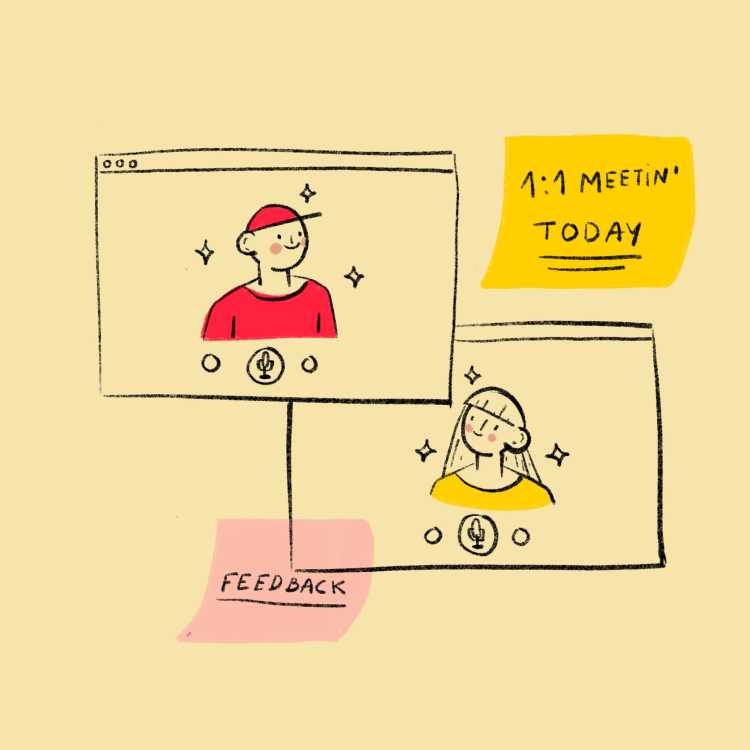Why 1-1 Meetings Are Crucial to Your Team's Success
By
Sara Davis
Sara Davis is the Head of Growth at Workast.

Sara Davis is the Head of Growth at Workast.
1-1 meetings or one on one meetings are a common way for many startups to work on employee development. In one-to-one meetings, managers are able to address any issues, foster a relationship built on trust and understanding, and ensure employees have an outlet to address any concerns. Building a culture of development personally and professionally gives companies an advantage in today’s world of work.
Without setting up a process, schedule, and agenda for one-to-one meetings - they can end up being less effective. So, we’ve put together a starting guide and game plan for you on how you can make the most out of your meetings.
Understanding what the goal of your 1-1 meetings should be. As a manager, your goal should be to hold the meeting as a safe and open space for discussion and feedback. These meetings should be treated differently than a regular day-to-day meeting, and serve as an open space to coach, listen, and mentor.
As managers, it can be difficult to handle the ebbs and flows of your daily work, manage meetings, and ensure projects are completed. One-to-one meetings are important to try not to reschedule. These meetings should be a set-in-stone re-curring meeting at least once a month with you and your individual team members. Set aside between 30 - 60 minutes for each meeting.
Try picking a day and time that typically is less busy for you when you’re setting up your schedule. Some managers prefer to schedule their meetings with their team on different days throughout the week, and some prefer to do them all in one day. Do what makes sense for you and your team. Ensuring that the day and time works for both you and your mentee, will help avoid potentially having to reschedule the meeting in the future.
It’s important to remember that employees leave managers, not companies. Your 1:1 meetings are a critical time for you to build relationships, address any issues, and listen. There is no typically “structure” for a meeting this style. You may need to listen to them vent any pent-up frustrations, or you may want to congratulate them for a project done well. Take the time to open up a safe space where you both may discuss whatever comes up. It’s important that as a leader, your team knows they can speak honestly and openly with you, and that you will do the same.
Just because these meetings don’t have typical structures, it is important to prepare yourself for them in advance anyway. This way you can know if there are certain items you want to make sure aren’t missed. If you have specific topics you’d like to discuss, create a private Meeting agenda. Add in any tasks, action items, or points you’d like to discuss, and then let the meeting take its course. This way you can review these action items later as well.
As you’re doing 1:1’s with your team, you’ll notice they get easier as you’ve done more of them. You may also notice that the more you build rapport with individuals, these meetings become almost fluid and more conversational than formal. This is the goal. Asking open-ended questions will give your colleague the opportunity to share more than close-ended questions.
How are you feeling?
Is there anything you are excited about? And/or anything you are worried about?
How can I help you with your day-to-day work?
Are there any topics you’d like to discuss specifically?
Knowing how to respond is as important in 1:1 meetings as the questions you are asking. Make sure you are transparent, affirm their thoughts and feelings, and show empathy. Talk about any mistakes you’ve made in the past relevant to the discussion, show vulnerability, and build an authentic feedback-loop. Make sure they know that their feelings and ideas are being heard and seen and that they feel valued as an employee. Always be willing to give constructive criticism and well-deserved praise.
These meetings are a crucial step in helping develop employee progression. Be respectful in your words, and take notes of your discussion, and create any high priority tasks. Being able to follow back up on the things you discussed in your last 1 on 1 meeting will allow you to see how progression evolves over time.
Evaluate your meetings as they progress through time. How are they progressing? Do you need to adjust the length of the meeting time to be able to have longer discussions? Are employees progressing and feeling better about their work through time? Evaluate your 1:1’s to see if there’s anything you can do on your end to make them more beneficial for you and your team.
Does your team have one on one meetings? What tips or tricks have you found to make the meetings most effective for you and your team? Send us a line or drop us a tweet to get your tips featured in this article.
